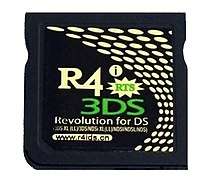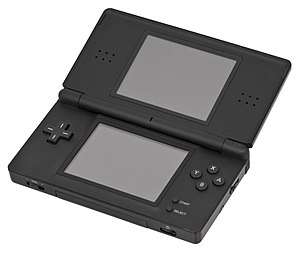R4 cartridge
The R4 (also known as Revolution for DS) is a series of flash cartridges for the Nintendo DS and Nintendo 3DS handheld system. It allows ROMs and homebrew to be booted on the Nintendo DS handheld system from a microSD card. This allows the user to run homebrew applications, to store multiple games on a single memory card, and to play games that have been backed up by the user.

The R4 flashcard's original developer stopped producing the R4 Card that plays ROMs and homebrew for the Nintendo DS, however, there are a new line of R4 clones that have taken its place, notably the R4 3DS, R4 Gold, R4 DSi and R4 NES, which are used to play ROMs and homebrew from various Nintendo platforms such as the Nintendo 3DS, Nintendo DSi, Nintendo DSi XL and Nintendo Entertainment System. Some of these cartridges can also store a 3DS boot image; a 3DS can in turn be made to boot from the cartridge by way of an undocumented button combination recognized by the system's bootloader. Since the 3DS's secure boot signature validation has been broken, this provides a useful means of installing custom firmware on a 3DS.[1]
Original cards
The original R4 cards use a microSD (<=2GB) card for its firmware and games, and does not support SDHC microSD cards. The original Revolution for DS card is no longer available in stores, although it can be bought online. However, there are other cards that are of similar quality made by other entities that have adapted the name, commonly referred as 1:1 clones. These are flash cards that use exactly the same hardware and are, for all intents and purposes, also referred to as the original R4 revolution. However, they often include SDHC support and other small changes and add-ons that make them different to the original R4 cards. However, using the official kernel for a clone card from the clone card's manufacturer can result in the card ceasing to function once a certain amount of time has passed, leading many consumers to compare the card to a sort of time bomb.
Legal issues
The R4 flash cartridges are banned in some countries due to copyright infringement lawsuits from Nintendo. In late 2007, Nintendo began a legal crackdown with a series of raids against R4 merchants.[2]
United Kingdom
In 2010, the company Playables Limited, importers of R4 flashcards, was ruled against by the London High Court. The ruling outlawed any sales, importation, or advertising of the R4 flashcards. The defence of Playables Limited claimed that the R4 flashcards were legal because it uses a homebrew application. However, bypassing Nintendo's security system is against the law in the United Kingdom. After the news broke, Nintendo released on a statement saying that they do support game developers that create their own applications legitimately. 100,000 copying devices including R4s were seized in 2009. Nintendo claimed that the cards were not only seized for the benefit of their own company, but the benefit for over 1400 video game companies that depend on the sales of their games.[2][3]
France
In October 2011, the R4 cards were banned in France. While Nintendo's original lawsuit was dismissed on the basis that the devices could be used to make homebrews and develop software in 2009,[4] the 2011 ruling reversed this, and the Paris court of appeals ruled against five R4 sellers and distributors. The sellers and distributors were fined over €460,000, and some were sentenced to jail.[2] Stephan Bole, the managing director of Nintendo France released a statement saying "Nintendo supported this criminal action not only for the company’s sake, but for the interests of its game developer partners who spend time and money legitimately developing software for Nintendo’s game platforms, and customers who expect the highest standards and integrity from products bearing the Nintendo name." [5]
Japan
In 2009, the government of Japan outlawed the sales of the R4 flashcard.[6] In 2012, the Japanese Ministry of Economy, Trade, and Industry revealed that the importing of R4 cards, and similar devices, is now punishable by law.[7] In 2013, Nintendo won a court case against two R4 card distributors in Japan. The Tokyo district court ruled that the sellers of the R4 cards owed Nintendo and 49 other video game developers ¥95,625,000.[6]
Germany
In 2009, Nintendo lost a lawsuit against a seller of flashcards, however Nintendo won the second and final instance. Since December 2014, flashcards are officially illegal due to Germany's copyright law. The seller and distributor of the R4 flashcards was fined over €1 million.[8]
Italy
In 2009, Nintendo started a lawsuit against a seller of flashcards,[9] which lasted three instances and ended only in 2017 with the sentence of the seller,[10] however the punishment is undisclosed. Curiously, in another trial held in 2016 Court of Catania declared flashcards legal since they have been exchanged for microSD-to-DScart adapters, citing the fact the R4 is not able to run any copyrighted code without a kernel, which is not sold with the flashcard, and the hardware-embedded protection breaking functionalities were considerate legitimate to run unsigned code.[11]
Other countries
Other countries that have banned the R4 flashcards include Australia,[12] Belgium,[2] and the Netherlands.
See also
- Nintendo DS and 3DS storage devices
References
- "ntrboot". 3ds.hacks.guide. Retrieved 8 May 2020.
- Ashcraft, Brian (4 October 2011). "R4 Devices Are Now Illegal In France". Kotaku. Retrieved 3 April 2014.
- Henderson, Rick (29 July 2010). "UK renders Nintendo DS R4 cards illegal". Pocket-lint.
- Toor, Amar (4 October 2011). "French court reverses DS flash cart ruling, Nintendo smiles". engadget. Joystiq. Retrieved 21 November 2017.
- "Nintendo DS: Nintendo Gains 4.8m Million In Piracy Battle, Bans R4 Flash Carts". My Nintendo News. 3 October 2011.
- Mallory, Jordon (9 July 2013). "Nintendo wins another legal battle against R4 flashcart resellers". Engagdget. Retrieved 26 April 2020.
- Ashcraft, Brian (22 November 2012). "R4 Cartridges Blocked in Japan by the Government". Kotaku.
- Jäger, Sebastian (13 February 2014). "Nintendo: Oberlandesgericht München: Flashkarten sind illegal". Gamona.
- Grasso, Rosario (28 January 2009). "Court of Milan emits a cautelary ordinance for R4". Hardware Upgrade.
- Pugliese, Tommaso (3 October 2017). "Nintendo wins the final audience". Multiplayer.
- Cella, Federico (12 May 2016). "Schede R4 per Ds, Nintendo sconfitta da un imprenditore di Catania" [R4 cards for DS, Nintendo defeated by a businessman from Catania] (in Italian). Corriere della Sera.
- Hall, Tanya (18 February 2010). "Nintendo wins lawsuit over R4 mod chip piracy". iTnews.
